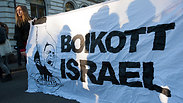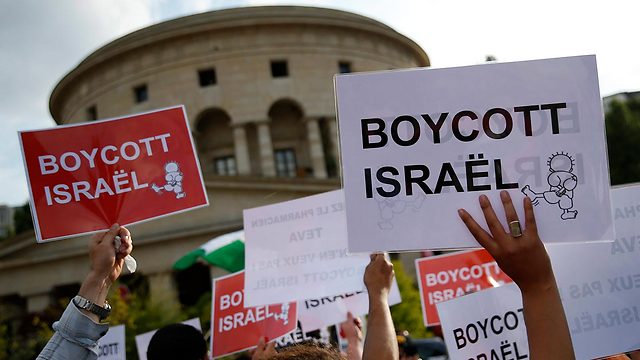
Yedioth Ahronoth and Ynet to hold anti-BDS conference
A series of panels and discussions dealing with Israel's struggle against the growing boycott movement opens Monday with the participation of President Reuven Rivlin, World Jewish Congress President Ron Lauder and comedian Roseanne Barr.
The conference, will feature a series of panels and discussions. Among the attendees are President Reuven Rivlin, World Jewish Congress President Ron Lauder; and comedien Roseanne Barr, who made a special trip to Israel to take part in the fight against BDS, among many others.
After an opening address by the conference's chair, Yedioth Ahronoth editor-in-chief Ron Yaron, President Rivlin and military historian and journalist Dr. Yoaz Hendel will discuss the boycott movement.
Next up will be a panel featuring Public Security Minister Gilad Erdan, whose office is in charge of fighting the boycott on behalf of the government; Ron Lauder, president of the World Jewish Congress; and Ben-Dror Yemini, a Yedioth Ahronoth editorialist and one of the most prominent voices in Israel and in the Jewish world in the struggle against the boycott. They will be joined by US ambassador to Israel Dan Shapiro and Foreign Ministry director-general Dore Gold.
A panel on the political campaign and the challenges of Israeli diplomacy will feature former chairman of the Yesha council Dani Dayan; Col. (res.) Pnina Sharvit-Baruch, an expert on international law; the European Union's ambassador to Israel, Lars Faaborg-Andersen; and Professor Uzi Arad.
BDS led a viral campaign to persuade the European Union to ban the participation of Ambassador Andersen in the conference due to the fact that Yedioth Ahronoth is a “right-wing newspaper fighting the Palestinian people,” and because the panel includes settler leader Dani Dayan. Anderson withstood the pressure and announced that he would participate in the conference.
Israel's political party leaders and members of the Knesset will also speak at the conference, including Finance Minister Moshe Kahlon, Interior Minister Aryeh Deri, Education Minister Naftali Bennett, Transport Minister Yisrael Katz, Justice Minister Ayelet Shaked, Infrastructure and Energy Minister Yuval Steinitz, Opposition and Zionist Union leader Isaac Herzog, Yesh Atid leader Yair Lapid and MK Tzipi Livni.
President Rivlin said on the eve of the conference that "Criticism is pointed, delegitimization is general. There is criticism that is only camouflage for delegitimization, and this type of criticism has to be fought with all our might. I see the BDS movement as one which spreads modern-day blood libels. It does not promote peace, but hate, and we must act to dismantle the BDS altogether."
Minister of Finance Moshe Kahlon stated that his responsibility is to make sure that the Israeli economy is not harmed as a result of boycotts and sanctions. He said that, to date, the Israeli economy has been standing strong against BDS and that the government will allocate as many resources as necessary to carry on the struggle.
Justice Minister Ayelet Shaked described the BDS movement as the 21st century-version of the Protocols of the Elders of Zion. She pointed out that BDS relied on Israeli organizations on numerous occasions to do irreversible harm to Israel."
Education Minister Naftali Bennett portrayed the BDS as a new kind of enemy. He stressed that Israel was able to destroy its former enemies and that it would be capable of doing the same against BDS, which tries to tie the IDF’s hands so that it won’t be able to defend Israel.
Opposition leader Isaac Herzog noted that "BDS is an ugly phenomenon. It is the combination of hatred of Israel, ignorance and even anti-Semitism. I, and my partners in the Zionist Union, have been fighting these phenomena for years, on every stage around the world, and will continue to do so out of great love for the country. The problem is that Israel has no foreign policy. There is no strategy. Without initiative, without a clear plan, even our best friends will find it increasingly difficult to fight those who hate us.”











